By John Helmer, the longest continuously serving foreign correspondent in Russia, and the only western journalist to direct his own bureau independent of single national or commercial ties. Helmer has also been a professor of political science, and an advisor to government heads in Greece, the United States, and Asia. He is the first and only member of a US presidential administration (Jimmy Carter) to establish himself in Russia. Originally published at Dances with Bears
Andrej Babis is the one of the wealthiest men in eastern Europe — if you bite bread, read a newspaper, fill your car with fuel, or put fertilizer on your window box in Prague, chances are you owe Babis money. He is also Deputy Prime Minister of the Czech Republic, Finance Minister, and candidate to become the next Czech President.
When Babis announced on Friday in Washington that he is planning to sue the US foreign policy establishment for libel, he wasn’t bluffing. His aim is to stop the US State Department, American officers at NATO headquarters in Brussels, and the war party in Kiev from attacking him as a Kremlin stooge.
The rise of Babis is also the takeoff of another albatross which is about to hang itself around the neck of candidate to become President of the US, Hillary Clinton. For it’s her campaign booster and pollster, Douglas Schoen and his old firm Penn Schoen Berland (PSB), which claim credit for inventing Babis’s political party, Akce Nespokojených Občanů (Action of Dissatisfied Citizens) – the acronym ANO also means “yes” in Czech – and putting Babis in power. From non-existence in 2011, ANO took 19% of the votes in the Czech lower house election of 2013, a close second behind the ruling Social-Democratic Party; 17% in the Czech senate election of last October. According to the American pollster, PSB’s Czech-educated executive, Alexander Braun is the winner of several US awards for his Czech political campaigns. He also claims credit, along with Schoen, for advising “notable clients…includ[ing] Tony Blair and Hillary Clinton, as well as presidents in Mexico, Ukraine, and Philippines.”
With the ANO vote running at close to 20%, and Babis’s voter approval rating at better than 60%, he and his appointees in the Czech Government control the ministries of finance, defence, justice, transport, environment, and regional development. Try buying, lighting, and stubbing out a cigarette between Karlovy Vary in the west, on the German border, and Ostrava in the east, near Poland, and you need ANO’s permission.
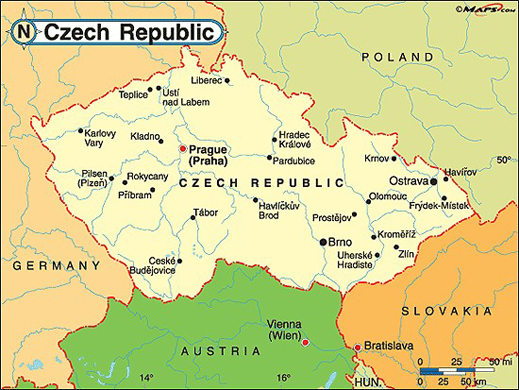
If it is American strategy to prevent Germany or Russia, or the two of them together, from ruling who can drop their butts in Eastern Europe, then the rise of the potentate of Prague is either a good thing, or a bad thing. For the time being, it’s an uncertain, so a dangerous thing.
When “Dragoon Ride”, a convoy of 120 armoured cars from the US Army and the North Atlantic Treaty Organization (NATO), tried to rally Czech support for American rule of Ukraine and war against Russia last month, it was the ANO ministries which refused to allow them to drive through Prague, diverting them instead to a military base on the outskirts.
The US Army called “Dragoon Ride” a “highly visible demonstration of U.S, commitment to its NATO allies and demonstrating NATO’s ability to move military forces freely across allied borders in close cooperation.” On March 29 the Stars and Stripes reported that “the convoy unleashed fierce debate among the Czech people and politicians. On Saturday, thousands of people gathered in Prague, the capital, to demonstrate support for and opposition to the convoy and American foreign policy.” The Ukrainian regime media called that “the opening of another Russian front in the Czech republic”, and the Czech Republic “Russia’s outpost in central Europe.” In Kiev Babis’s ANO was called the “Führerpartei”.

Source: http://www.demotix.com
Caption: “US soldiers from the 3rd Squadron of 2nd Cavalry Regiment are preparing to leave the Vyskov Area near the Brno, Czech republic, 29 March 2015. The soldiers finished their 3-month-long training in Poland and now they spend three days in Czech republic.”
 The Ukrainian allegations were published on March 29. On April 13 a US-supported think-tank in London calling itself the Henry Jackson Society published a report on Babis entitled “Now the Czechs have an oligarch problem, too”. The author was Andrew Foxall (right), who heads the Jackson group’s Russia Studies Centre. Foxall has been an academic in Belfast. For several days he has had a problem. When readers tried to open his report on Babis, the link was blocked by what was described as a “fatal error”. The think-tank now says “that was a technical problem with our website.” It can now be read here.
The Ukrainian allegations were published on March 29. On April 13 a US-supported think-tank in London calling itself the Henry Jackson Society published a report on Babis entitled “Now the Czechs have an oligarch problem, too”. The author was Andrew Foxall (right), who heads the Jackson group’s Russia Studies Centre. Foxall has been an academic in Belfast. For several days he has had a problem. When readers tried to open his report on Babis, the link was blocked by what was described as a “fatal error”. The think-tank now says “that was a technical problem with our website.” It can now be read here.
The Jackson think-tank reports patrons representing the US Council on Foreign Relations; the US National Endowment on Democracy; General Jack Sheehan (below left), a former US NATO commander and now lobbyist for the Bechtel construction company; former Pentagon official, Richard Perle (centre); and Robert Kagan (right) a foreign policy advisor to several secretaries of state. Kagan is the husband of Victoria Nuland, the State Department official currently in charge of eastern Europe and the Ukraine war.
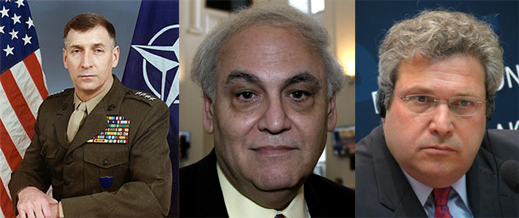
On Friday (April 17) Babis was in Washington (below, right) for the annual spring meeting of finance ministers at the International Monetary Fund (IMF), announcing there that the Jackson Society’s allegations are “a pack of lies and dirty tricks…What a coincidence that it was published [on April 10] two days before I arrived [in the United States].”

Babis directed his public attack against Foreign Policy, which published Foxall’s report in the US. The magazine was owned by the Carnegie Endowment for International Peace until 2008, when it was bought by the Washington Post. When the Post was sold in 2013 to Jeffrey Bezos, the Amazon.com owner, Foreign Policy was one of the small properties in the deal. It calls itself “A Trusted Advisor for Global Leaders When the Stakes are Highest.”
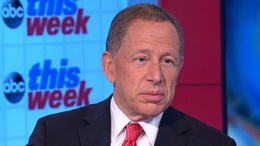 David Rothkopf (right), the editor of Foreign Policy, is an apparatchik from Bill Clinton’s administration. He also owns a company called Garten Rothkopf, which he describes as “an international advisory company specializing in global political risk, energy, resource, technology and emerging markets issues based in Washington, D.C.” According to the company, it specializes in “focus on political realities that uncovers the likely – though often unintended – consequences of government action”.
David Rothkopf (right), the editor of Foreign Policy, is an apparatchik from Bill Clinton’s administration. He also owns a company called Garten Rothkopf, which he describes as “an international advisory company specializing in global political risk, energy, resource, technology and emerging markets issues based in Washington, D.C.” According to the company, it specializes in “focus on political realities that uncovers the likely – though often unintended – consequences of government action”.
Rothkopf is a booster of the Hillary Clinton campaign. Two years ago he claimed in print “there are few certainties in American politics. But you can write it down: If Hillary Clinton wants to be the next nominee of the Democratic Party to be president, the job is hers.” Rothkopf also claims Clinton “has been the most successful U.S. secretary of state in two decades.”
Rothkopf’s company calls Steptoe & Johnson, a law firm in Washington, its “strategic partner”. Steptoe has been the registered lobbyist in Washington for, among others, Bulgaria, Hungary, Canada, Turkish-occupied Cyprus, and the Dominican Republic. According to US government filings, the money flows at more than $1,000 per hour from the foreign client to Steptoe, and from Steptoe to Rothkopf and his associates.
Last week Babis called Rothkopf and his publication “a medium that is known for writing to order… I have already called on them to apologise to me, and unless they apologise, I will hire lawyers in the United States and I guarantee to you that they will apologise to me. It is a pack of lies and untruths.” Rothkopf was asked what response he makes to Babis’s comments. He refuses to reply.
Foxhall says “we stand by our story.” So far, he added, “we have not received a letter from Mr. Babis’s legal representatives.” He declined to explain why his report omits to mention Babis’s US ties, except that they were “marginal to the central argument”.
A few days earlier, Babis had called the US Ambassador to Prague, Andrew Schapiro, to his dacha near Prague to discuss his planned trip to the US. Schapiro’s mother was of Jewish Czech origin; he was born in the US after World War II. A wealthy lawyer, Schapiro has been a fundraiser for the Democratic Party’s National Finance Committee; he is one of Hillary Clinton’s campaign supporters.
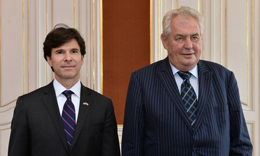 Between conversations with Babis, Schapiro (right) launched an attack on Czech President Milos Zeman for agreeing to attend the parade in Moscow on May 9, celebrating the 70th anniversary of the defeat of Germany in the war. Speaking on Czech television at the start of April, Schapiro had said: “it would be unfortunate for President Zeman to be there as perhaps the only EU head of state, watching a military parade, at a time when Russian troops are destabilizing a neighbour in violation of international law.”
Between conversations with Babis, Schapiro (right) launched an attack on Czech President Milos Zeman for agreeing to attend the parade in Moscow on May 9, celebrating the 70th anniversary of the defeat of Germany in the war. Speaking on Czech television at the start of April, Schapiro had said: “it would be unfortunate for President Zeman to be there as perhaps the only EU head of state, watching a military parade, at a time when Russian troops are destabilizing a neighbour in violation of international law.”
Zeman replied: “I can’t imagine the Czech ambassador in Washington would give advice to the American president where to travel. I won’t let any ambassador have a say about my foreign travels. Ambassador Schapiro has the door to the Castle [Prague’s presidential residence] closed.” Under subsequent pressure from Washington and its supporters in Prague, Zeman has insisted his trip to Moscow next month is a “sign of gratitude for not having to speak German in this country.” He has conceded that he will attend the celebration, but not the military parade.
After Babis’s last meeting with Schapiro, according to the Czech financial paper Hospodarske noviny, Babis appeared to take sides with Schapiro against Zeman. Hospodarske noviny is owned by rival Czech oligarch, Zdenek Bakala. Babis, according to the newspaper, called for an increase in the Czech budget for defence spending. Babis is the minister in charge of the budget; his ANO colleague, Martin Stropnicky, is defence minister. “The U.S. offensive [against Babis] has succeeded”, reported Hospodarske noviny. “Last autumn, Babis was reluctant to adopt a clear position on the Ukrainian crisis, but now he seems to be a sort of hawk.”
The Czech hawk is a bird of a different feather. Compared to the NATO requirement – called the Wales pledge, after the NATO summit meeting of September 2014 — that member states spend 2% of their GDP on defence, the current Czech budget allocates 1.04%. As finance minister, Babis has cut defence spending from his predecessor’s budget from 1.08% to 1.04% this year. He has accepted an increase in defence spending to 1.07% by the year 2017.
Czech media have reported this month that Babis “was claiming until recently that he is not interested in foreign policy, anti-Russian sanctions are useless and the Ukrainian crisis is just ‘a competition between American imperialism and Russian.’ However, then something happened and Babis changed his stance all of a sudden. He started criticising Vladimir Putin´s regime, praising the Western sanctions against it and challenging President Milos Zeman´s planned trip to Moscow.”
According to Czech reporters, Babis’s change of mind is the result of lobbying by Schapiro and advice from “Babis´s main strategist Alexander Braun.” For more from PSB on Braun (below) as the grey cardinal in Prague, read this. In 2013 Hospodarske noviny called him the most influential man in Czech politics whom noone knew. In April 2014 Aktuálně.cz reported Braun was still on Babis’s payroll for the European Parliament and Czech Senate election campaigns. “Cooperation continues”, Braun was reported as saying.
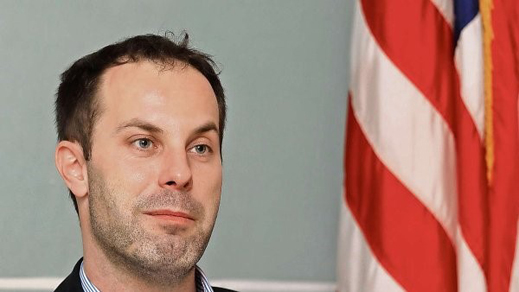
This week in Washington Braun was asked to clarify his current role as advisor to Babis, and to explain why this has not been registered with the Foreign Agents Registration Act (FARA) unit of the US Department of Justice. He was also asked to respond to the allegations in the Jackson Society, Foreign Policy reports. Braun didn’t respond.
Babis’s business operations, as reported in the Czech press, are consolidated into a holding called Agrofert. This now includes about 200 companies operating in the Czech Republic, Slovakia (Babis is originally Slovakian), Hungary, Poland, the Netherlands and Germany. They represent a vertically integrated agro-industrial chain, including crop farms, fertilizers, vegetable oil and ethanol fuel, meat processors, bakeries, and chemicals. For more on Babis’s interest in state subsidies for increased volumes of ethanol in Czech auto fuel, click.
Babis has also expanded into the Czech media, as have several Czech oligarchs before him. As he has done so, journalists opposed to him have banded together to form Echo-24, an internet medium which specializes in bashing Babis. Echo-24 is financed by Jan Klenor, a recent chief executive at Patria Finance, a stockbroker which is part of the Czech CSOB banking group, owned by KBC of Belgium. Echo-24 accuses of Babis of concealing a past of Soviet and Czech security service links. The publication is silent on Babis’s present American ties.
Czech sources believe Babis has Russian business interests, claiming his companies obtain supplies of fertilizer and crude oil from Russian producers. Russian customs data for fertilizer exports indicate relatively small volumes go to the Czech Republic; the major Russian exporters refuse to say if they have significant dealings with Agrofert.
Most Russian crude oil exports to the Czech Republic originate with Rosneft, and go to PKN Orlen, the dominant fuel supplier in the country. Listed on the Warsaw Stock Exchange, PKN Orlen’s largest shareholders are the Polish government; ING Bank; Aviva insurance company; and the pension fund Zlota Jesien (“Golden Autumn”), also part-owned by the state through PZU, the largest Polish insurer.
PKN Orlen has been in litigation for many years with Babis, compensating for some of his claims but winning Czech court victories over him for most of the claims. In June 2013 Rosneft and PKN Orlen signed a three-year crude delivery contract for 8 million tonnes, worth at the time about $7 billion. The Czech signatory for PKN Orlen said at the time: “Rosneft is one of the main partners for PKN ORLEN S.A. for crude oil supplies. The cooperation of the companies is being built on the basis of sustainable and long-term repetitive and stable cooperation and fair market mechanisms.” In Moscow last week, Rosneft refused to say more about its Czech relationships.
LUKoil and Gazprom Neft have also delivered crude to the Czech Republic for refining domestically. But LUKoil, according to Moscow reports, pulled out of sales to Prague the year before Rosneft signed on.
Babis’s business interests in Czech energy supplies have so far been confined to fuel additives such as ethanol. Gazprom delivers natural gas to the Czech market without involving Babis: it flows through the German-owned RWE group; MND which belongs to Karel Komarek, another rival Czech oligarch; or Vemex, a local company controlled by Gazprom itself. Babis may have an interest in increasing local biogas production; this competes in the Czech market with Russian gas. As for nuclear energy, so far Babis has not been directly involved in the politically charged and protracted negotiations between Prague and Moscow over Rosatom, the Russian nuclear power agency’s bid to build new reactors.
 Russian analysts of the Czech Republic recognize Babis’s political importance, but say they know little about his business. Trukhachev (right), a specialist on Czech affairs at the Russian State Humanitarian University in Moscow, notes there is strong resistance among Czech voters to the expansion of NATO or American military operations or weapons installations on Czech territory. Babis’s ANO voters are evenly divided for and against sanctions against Russia, Trukhachev says.
Russian analysts of the Czech Republic recognize Babis’s political importance, but say they know little about his business. Trukhachev (right), a specialist on Czech affairs at the Russian State Humanitarian University in Moscow, notes there is strong resistance among Czech voters to the expansion of NATO or American military operations or weapons installations on Czech territory. Babis’s ANO voters are evenly divided for and against sanctions against Russia, Trukhachev says.
“Czechs have a good historical memory. They remember the German tanks in 1939; they remember the Soviet tanks in 1968, so they will be just as unhappy with American tanks. It’s difficult to predict [the views] of Andrej Babis, because on the one hand he seems to be a [economic policy] liberal. On the other hand, for [support of the geopolitical doctrines of] Atlanticism he hasn’t been noticed.”
Gennady Nechaev, a military affairs correspondent in Moscow for Vzglyad, who reported from Prague for several years, says Czechs take US military pressure “negatively, as the country likes to be clean, quiet. They do not like, and do not accept such kind of noise. It is clear that this action plan [Dragoon Ride] is likely to have the direct opposite of the effect the Americans want. During the term of the Warsaw Pact, the Soviet Union practiced such actions – they caused terrible discontent. This military task is very complicated — moving large masses of weapons and equipment through densely populated areas under its own power. The propaganda purpose is not justified, at least in the Czech Republic, at least for now. Look what happens.”
For the Czechs’ northern neighbour, Poland, the biggest interest south of the border is PKN Orlen. Babis’s attempts to take assets out of the Czech operations of the Polish company has not endeared him to Warsaw politicians nor to the Polish intelligence services. OSW, the state think-tank in Warsaw, reports regularly on Czech developments, but has so avoided analysing Babis.
This month OSW analyst Jakub Groszkowski reported that the Czech government is deeply divided over “the difficult art of balancing” its trade and investment interests with Russia and its obligations as a member of the European Union and NATO. OSW has also acknowledged “openly anti-American and pro-Russian views” in Czech public opinion, estimating that at least 25% of voters oppose NATO.
Babis’s personal popularity among Czechs, and his holding’s low indebtedness to foreign banks make him an attractive figure to European, as well as to American bankers familiar with Czech business. “He is very disciplined; he isn’t flashy,” says an international banker in Prague. “He is competitive, but unlike the Russian oligarchs he is not heavily leveraged, and he invests at home.” His business reputation is stronger than his peer — the wealthiest of the Czech oligarchs, Petr Kellner, claims a European banker with direct experience in Prague. “Czechs run a small kitchen by European standards, and they like it that way. They prefer others keep out, too.”
For an analysis of the offshore registration and tax minimization operations of Babis’s rivals Kellner, Komarek and Bakala, read this. This government radio report claims Babis is the local oligarch exception for “stay[ing] behind to pay Czech tax.”
In New York the Clinton Foundation identifies few donors from the Czech Republic. One is Vladislav Drab (below, left), the chief executive of American Power Supply and Czeska Energie (CE Group), traders in imported natural gas, LNG, and electricity for the Czech market. Drab’s donation to the Clintons is listed in the $100,000 to $250,000 range. Drab received this souvenir from Bill Clinton:
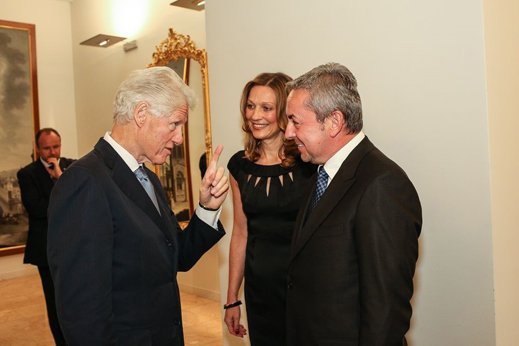
Drab and Clinton at an energy summit conference at the Prague Castle, May 2012
Source: http://www.gscep.cz/cs/aktuality
Another in the Clinton roster of donors is Braun’s firm Penn Schoen & Berland (PSB), which is recorded as making a donation of $50,000 to $100,000. If Braun was fronting for Babis or another of Braun’s clients, he isn’t saying. There is no record at the US Justice Department’s foreign agents’ registry that Braun or PSB represent either Babis or a Czech government entity or business. If Braun has been billing Babis for advice on which US Government officials to meet, he isn’t obliged to register as a foreign agent. If he picks up the telephone to arrange a meeting, the law requires him to register.
The Washington Post, Wall Street Journal and Newsweek have all been reporting in recent days on the foreign business and government lobbying of Hillary Clinton accompanied by large donations to the Clinton Foundation. For more on the $13 million in donations which Ukrainian oligarch Victor Pinchuk has made to the Clinton Foundation, on the advice of lobbyist Schoen from PSB, click. This week Newsweek is reporting that while Pinchuk was giving money to the Clintons, Hillary Clinton as Secretary of State overlooked his breaches of US and European Union sanctions against trading with Iran.
Schapiro and others from the Clinton entourage are now pressing Babis and the ANO to reverse Czech policy, and revive earlier US and NATO plans to establish missile batteries and other military deployments on Czech territory. An American source in Prague says: “Babis doesn’t work for the Americans, but he doesn’t like Zeman. Clearly he is out to become president himself. He is likely to succeed.


First i heard of that “dragoon ride”. And i can’t say if it is a demonstration to NATO members, or a reminder to EU about who is the real boss of Europe…
Any time someone drives a tank down your street its a reminder.
Touché, Sam!
It is clear that this action plan [Dragoon Ride] is likely to have the direct opposite of the effect the Americans want. During the term of the Warsaw Pact, the Soviet Union practiced such actions – they caused terrible discontent.
I have relatives through my spouse in the Czech Republic (not in Prague but in a major city) who saw US troops driving around and their reaction to the “dragoon ride” was that the Americans were acting like the Russians. The exact opposite of what the US wanted (acting like an occupying force rather than allies).
Patton was in Pilsen in 1945 but was forced to pull out consigning Czechoslovakia to the tender mercies of the Red Army for 47 years. Americans were always well thought of — being put in the same category as Russians (by people who remember 1968) is terrible.
One final note — Czechs were with the US in Iraq — supplied specialized CW personnel.
So who can ever find the documents to prove that in 1945 we signed a deal with Stalin ceding Eastern Europe to the Soviet Union. After the armistice, maybe, but not before, and before was when the deal was cut. Fast forward to today and capitalism has been shown to be a huge ponzi more or less. A ponzi that will take many decades to unwind. But the roster of monsters in our State Department seem proud to have their portraits in the yearbook.
It’s in Churchill’s memoirs, and was the Yalta conference.
There is of course this, when Churchill and Stalin carved out the respective zones of influence in Eastern Europe — and that agreement took place even before Yalta.
Given that the Red Army was already occupying eastern Europe the notion that it was “ceded” to them is obviously erroneous. The Western Allies did nothing more or less than acknowledge as graciously as possible “facts on the ground”.
Dumb move in a quiet and non-hostile country to the US. Stayed in Prachatice and Krumlov working with an electronics supply base for automotive.
I can’t tell what is better amongst the worst. A world of nation-states run by quasi-autocratic billionaires (Putin comes to mind) or a hodgepodge of corrupt governments with capitalist interests all trying to outspend their competitors to purchase influence. Does the latter naturally progress to the former? I’m willing to bet there are a number of billionaires in the USA that are either friends of Babis or sympathize with his principles. Put as briefly as possible, with so many nodes of deep capital all representing particular interests I’m thinking it is becoming increasingly difficult to build a cohesive front WRT foreign policy. We are fast becoming a world of lords, barons, and dukes.
‘With so many nodes of deep capital all representing particular interests I’m thinking it is becoming increasingly difficult to build a cohesive front WRT foreign policy. We are fast becoming a world of lords, barons, and dukes.’
‘Fast becoming?’ We’re there. What do you think brought about the fiasco that was the U.S. occupation of Iraq?
I look at that era differently. The Afghan and Iraq wars may have had monied interests involved (as is always the case historically) but there was still the state myth front and center rationalizing the whole process (fueled by 9/11, War on Terror). Guys like Kristol and Wolfowitz were true believers in American power and exceptionalism in my view, not quite what we are seeing now. I’m just wondering with the increased concentration of capital in individuals globally, each representing their own power independent of the state, if the old myths and rationalizations are needed any longer to “motivate” the mechanisms of the state. They (as in the “lords, barons and dukes”) simply say it should be done and it is done without all the annoying work of motivating the masses or providing an emboldening ethos. Looking at our poorly executed and justified (not implying past wars were justified) interventions and wars globally since “wrapping things up in Iraq” it looks like the traditional process of war making has clearly changed. No explanation is needed, no threat needs to be expounded. Reagan had the commies in Central America, Bush and Clinton the “truism” of America the protector, and Bush Jr. the fight against terrorism. l don’t see how anyone in government could explain and justify Libya, Syria, Ukraine, and Yemen (I’m leaving many out)? From what I remember and continue to read and hear, they really didn’t/don’t provide rationalization. Wars just happen now and what is worse they are in plain view all over MSM. At least the government tried to hide their murderous business in the 80s and 90s because there was a sense that it was something to be ashamed of. In addition, congress doesn’t even get a word in. At least with Reagan, Bush, Clinton and Bush Jr. they blew some hot air. The inverse of all this, as is the case with Mr. Babis is an increased amount of factionalism globally. Maybe there is some aligning with heavier hitters like Putin, but these monied powers remain autonomous none-the-less. Without the state myth, the state becomes less an object to protect, albeit cynically, and more a resource to exploit.
Rosario wrote: ‘The Afghan and Iraq wars may have had monied interests involved … but there was still the state myth front and center rationalizing the whole process (fueled by 9/11, War on Terror). Guys like Kristol and Wolfowitz were true believers in American power and exceptionalism in my view, not quite what we’re seeing now.’
No. I understand what you’re saying. But the hijacking of the Iraq occupation by the various MIC factions rendered ‘guys like Kristol and Wolfowitz — true believers’ into mere superstructure — gingerbread — and essentially was the turning point.
It showed erstwhile allies that as a hegemon the U.S. had become incompetent and unfit for purpose, because any sensible U.S. strategy — and Pax Americana itself — would invariably be subordinated to the interests of commercial entities that (a) had the wherewithal to pay off the relevant Washington personages and (b) were seeking only opportunities for looting and profit.
It was a circus. James Risen’s reporting — as in his book, PAY ANY PRICE — is a good introduction, though he tells not even the half of it.
Cheney ran the White House at least during the first term which meant he was a singular point man. In the current climate, we are faced with a more fractured world, a relatively weaker military with less allies ( we need supply routes, drones have drawbacks, many soldiers aren’t as reliable after multiple tours, and tactics are developed against wunder weapons. Unlike Iraq, potential foes won’t sit out a fight expecting to be handed power when we get bored.), and “no drama” Obama.
Take the DEA news today, the ACA debacle, and the VA crisis. There is a unifying thread which is an out to lunch President concerned with the no drama image. The message is the White House isn’t interested in anything other than not risking potential embarrassment, it’s open season on limited pet projects or an event one can con the White House into. The White House will clearly overreact and not size up a situation, given that Obama is entirely too reliant on a small Cadre of clowns such as Sam Powers.
What we see with Libya, the drones, Ukraine, Iran, the pivot to China, dropping the Monroe Doctrine but not the Dubya doctrine, ISIS and so forth is a President out of control and reacting to be seen as always competent and in control. Firing a Shinseki undermines Obama’s 11th dimensional chess myth, so the embarrassment has to become glaring.
I certainly despise Cheney, but his Washington was much more ordered than the current Versailles because he didn’t try to please every lord and better understood the carrot and stick approach. Cheney bought off Team Blue Congressmen with pork for their district. Obama tried to get Team Blue Congressmen to cut Social Security by cutting spending in their districts.
I’m no Obama fan, but one has to consider the overt, blatant attacks by his opposition to outright ruin any of his initiatives, no matter the cost to our nation; that would make any POTUS more likely to work from a defensive position. That said, Obama squandered his early mandate; has been too tentative; and, appears to have over-thought and over-considered too many of his initiatives. Add to the foregoing that he’s not a natural leader.
Given the amount of money pouring into the 2016 election cycle, it’s going to be very difficult to know anything accurate about any of the candidates. No matter our political preferences, we’re all going to be voting for media-created phantoms.
Worth mentioning that David Rothkopf is not merely a “Clinton apparatchik,” but a significant former Kissinger Associates employee, which is where he learned to play these games in this league.
I am terribly confused. Which side does this article think are the good guys? Or is the point that there are only bad guys?
The answer to your question is : Yes there are only bad guys.
LOL You’d think they could photoshop in white and black hats in so an unsophisticated American can keep score. They could always photoshop the hat color changes later on as the situation dictates.
It’s a shocker that someone we once supported that now has power thinks we’re a bully. How does this story end again? I wonder how long before replacing him becomes a “national security interest”(because the middle class always gets to pay for the rich capitalists to squabble over who should own a country’s resource pool?)
A nice little peak at people who, when tragedy befalls them, we cheer.
I can only assume you’re new to Helmer: Russia is the good guy. This will become very apparent the more of his stuff that you read. It’s the only country whose motives, interests and conduct are held above all question or suspicion, and it is beset on all sides by an evil Western cabal consisting of the United States and its various puppets who are plotting to drag the peace loving Russians into a war through dastardly, unconscionable acts like resisting Vladimir Putin’s efforts to dismember the Ukraine.
If Helmer isn’t receiving subsidies from the FSB for conducting public diplomacy on behalf of Putin then he’s being ripped off.
If you have a choice between seeing the seeing the big picture and being able to learn about the details and respond accordingly, or knowing the small details in a specialized area, which would you choose?
The empire is the latter, which you spend 10% of your time on, and appears on your resume, which satisfies HR. You spend 90% of your time on the former, which scares the hell out of the empire, and you leave off your resume, telling the supervisor a few things once you get to that interview. And give the moron behind the big desk waiting for ‘the next big thing to present itself’ a second derivative of your development, to belong to the herd, expecting to be used and thrown away, by a pyramid of politicians, maintained for the purpose.
Currently, the empire is at peak favor for female politicians, because they have the most resources under their control to exploit, at the end of a demographic boom, so most female voters, most male voters depending upon females, and all males using females for the purpose, are going to vote for Hillary, regardless. If you are going to get upset about Hillary, or anyone else, being voted in as President, you have already lost the war.
Obama was the set-up man. If the wave crests too soon, you will get a Republican. What were the Roosevelts doing in China?
At the beginning of an economy, the middle class grows toward labor, and then toward capital with each successive iteration, until labor has completely abandoned it, working on the next two economies, which, from the perspective of empire, will merely change the dress.
The president will be the one that gives the moneychangers the most control, over the economy they can see. Reagan turned a blind eye to opensource and was helped accordingly, when it mattered. Napping is not a bad policy.
The Henry Jackson Society? Neocon Central? With Richard Perle and Robert Kagan in there stirring the pot, trying to start WWIII.
The Henry “Scoop” Jackson Society? Yes, the very same.
Nice job on that thread over at SST the other day. Do be sure to let us all know when that book you are working on is available, please.
Thanks, JerseyJeffersonian. My head is still reeling from this article, and seeing the photo captioned, “US soldiers from the 3rd Squadron of 2nd Cavalry Regiment are preparing to leave the Vyskov Area near the Brno, Czech republic, 29 March 2015.”
I mean, WTF ?!? Why has no one reported on this in the MSM. ?!? No need to answer, just a rhetorical burst of frustration from me.
Hmmm..
Babis is a very typical oligarch, and Czechs elected him because they were sick of corruption in other parties on premise that as an oligarch he doesn’t need to be corrupted. Which is true, except that more than a few miss the fact his business would suffer massively w/o state money, and when you get stuck right at the top, making the laws, it’s not called corruption anymore. They are waking up to that now, albeit very slowly. It helps him he’s not actually the PM, since then he could be easily blamed for lots of what goes in, but now he can shunt it to his coalition partner social democrats. I’d not bet on his going one or the other way, as it’s still way too fluid, and very much depends on stuff like the overall economy performance.
Czech president is a super-populist who’s well known for inventing facts as they fit him. Unfortunately, that seems to be a common thread with his predecessor. Even more unfortunate is that there’s no-one who could replace him who wouldn’t be as bad or worse (lucky Slovaks next door, when it looked like their PM could become president and concentrate power ala Russia or Hungary, they elected a non-politcian who appears to actually hold some moral values).
Re the Dragoon Ride. It was movement of US troops from Baltics via Poland to their bases in Germany. This happens few times a month, the difference now was that it was on roads and well publicised as opposed to train transports. It was actually mostly aimed at Poland and Baltics as a show of support in case little green man appeared in Latvia or Estonia. It was very well accepted in those states.
Czechs had the most vocal opposition to that, which was mostly rusophiles and old communists (ironically often the same who invited/supported Soviet invasion in 1968). But it was still a small minority. The roads of Dragoon Ride were packed – with people holding up placards like “you’re 70 years too late” and in general being welcoming to the US soldiers. As for stopping it going via Prague – well, Prague is a medieval city. Routing it around the city made it easier for everyone, and the base outside the city is a stone-throw. The disruption to quite a commuters wouldn’t be that great a PR.
But it’s no wonder that someone from russian think tank says it was counterproductive. I would expect nothing else – the same way, as I wouldn’t expect a US think tank to say anything else than it was a resounding success.